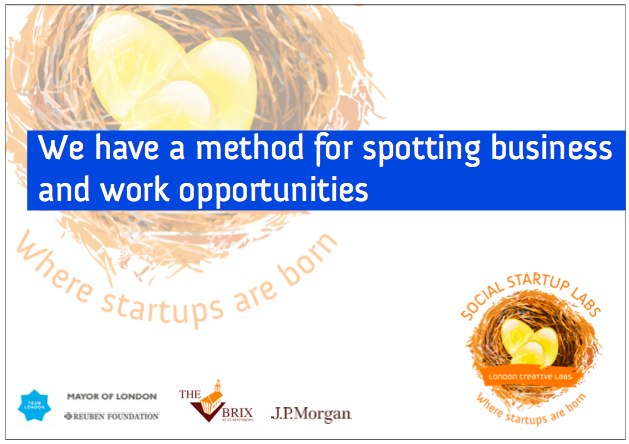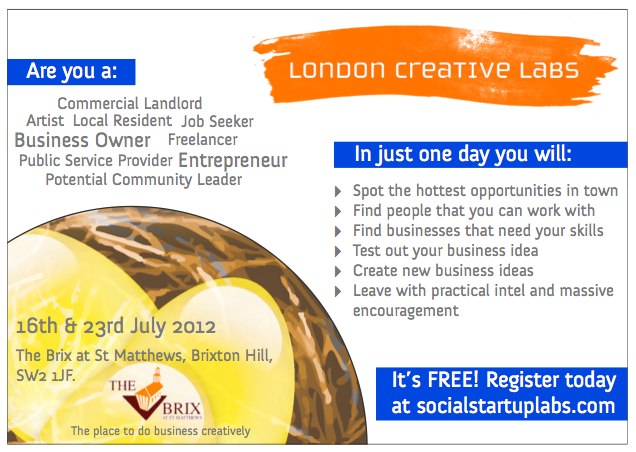Overview
What a day! 46 people spent a day mapping what we already have available to us and what solutions could be brought to the Loughborough Junction neighbourhood's needs. The event was organised by
Capital Community Foundation and facilitated by London Creative Labs.
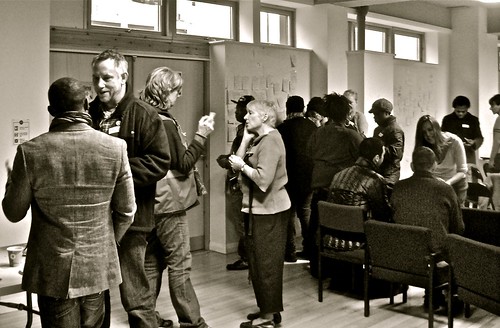
It was intense, we worked from 10am to 5pm.
"Astonished at how much info you got out of the group."
"Great to find so many enthusiastic people to gather ideas on the community requirements."
Detailed Results
In the morning we began by looking at who was present in the room.
We had a basic key:
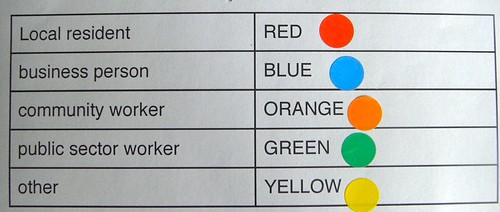
Here is an example of "who is here". And on the right is the bigger map of Loughborough Junction area, on which we pinned the people information.


Your data:
Click here to see the full set of photos of 'who is here'.
Click here to download a digital list of all the 'who is here' data
Assets
In the morning we began by looking at what we already have. We defined types of assets as building, equipment, skills, knowledge, time and other.
We had a basic key:

Here is an example of an asset that was identified. And on the right is the bigger map of Loughborough Junction area, on which we pinned the assets.

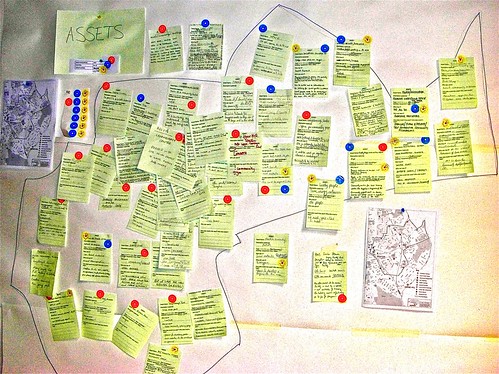
Your data:
Click here to see the full set of photos of all the assets.
Click here to download a digital list of all the assets identified
Needs
After mapping assets, we looked at needs: This we defined as either a service at risk, an asset at risk, a lack of a service or asset, and "other".
Here is a basic key:
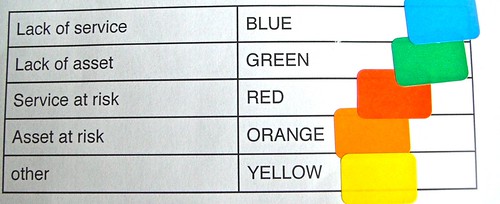
Here is an example of a need we identified. And on the right is the bigger map of Loughborough Junction area, where we pinned all the identified needs to.
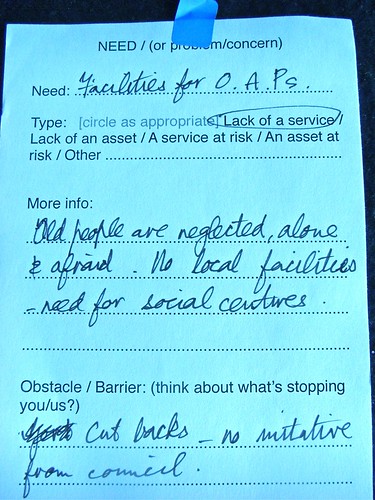
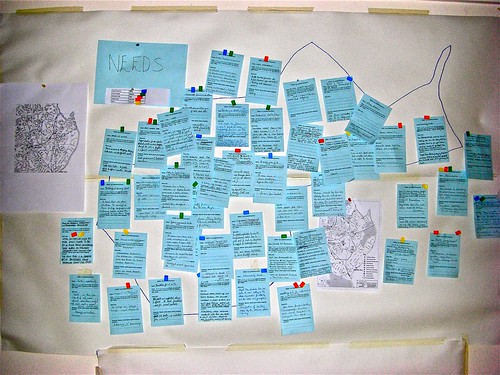
Your data:
Click here to see the full set of photos of all the needs.
Click here to see the digital list of all needs
Opportunities
Of course, if there are assets, and we have needs, then there are opportunities to be had! The point is that we can act on opportunities. This is what we looked at next. It is important when looking at pieces of a map, to get a sense of the overview, so that we can all spot the patterns, little by little. This is why we had the maps in the room, so that people can look at them as a whole.
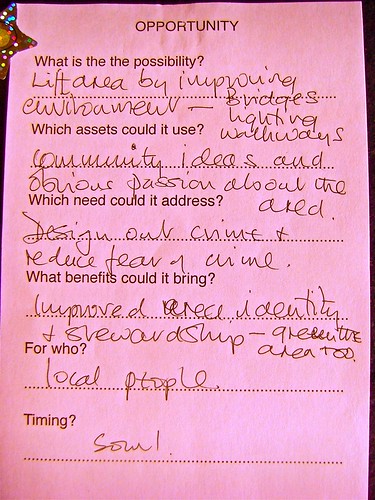
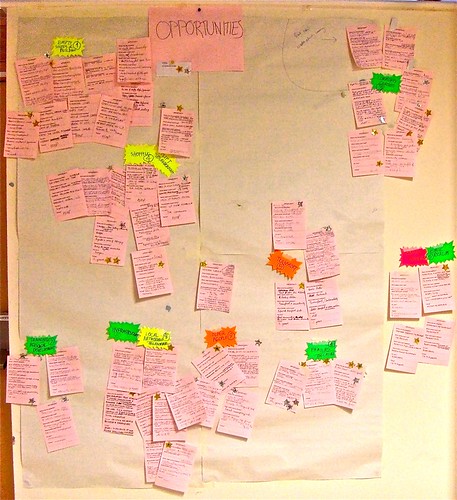
Here is one example of an opportunity and then to the right is the bigger map of them all, which we prioritized as a group. Over lunch a few of us then clustered them into themes.
Your data:
Click here to see the full set of photos of all the opportunities identified.
Click here to see the digital list of all opportunities identified.
Themes emerging from the Opportunities
These themes emerged from clustering the opportunities.

We reflected on these themes as a group and chose the ones we wanted to focus on. A few people then led discussions on them throughout the afternoon. There were 8 discussion groups in the end.

Solutions
In the discussion rounds we looked at what kind of solutions we could bring.
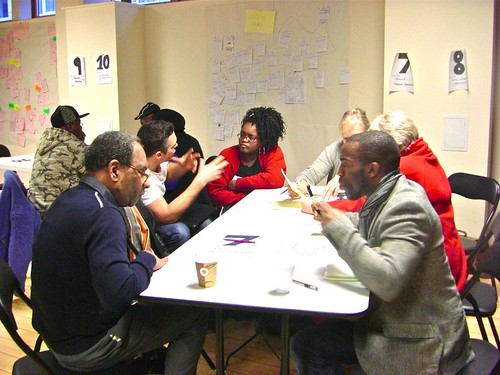

Specifically, the discussions had the following structure: What are possible solutions, what obstacles could there be, how we could overcome them. Here is an example of the outcome:


Your data:
Click here to see the full set of photos of all the solutionss identified.
Click here to see the digital list of all solutions identified.
Bringing it all together
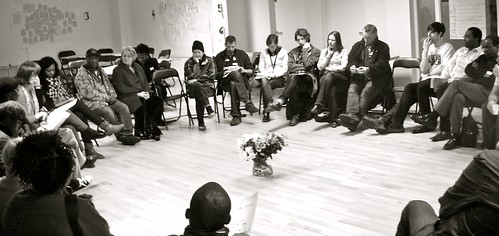
We gathered back in plenary and shared outcomes. Some links between issues were spotted. For example, just the fact of focusing on young people led to a combined discussion of older and younger. It is important to spot these connecting links. If we do this as we go along, we will have less chance of working in silos.
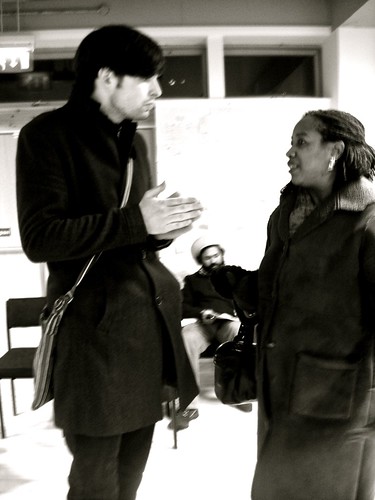
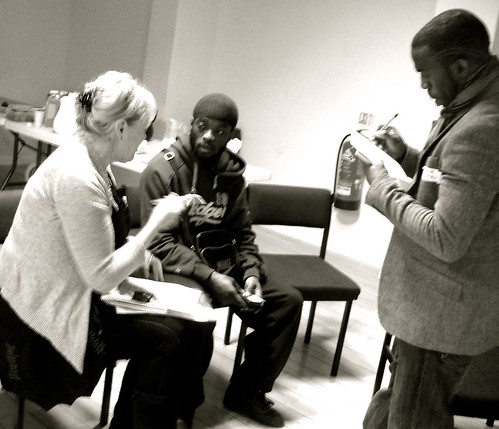
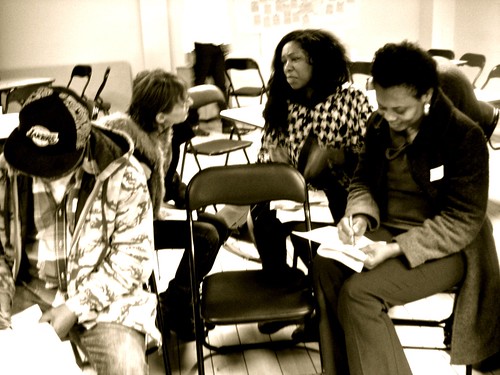
The Second Event - Loughborough Speaks Again! Feb. 16th 2011
This event built on the first one. A newsletter was produced which enabled those who came to the first event to recall the outcomes, and also those who were not there to at least get a sense of where we were starting from. This time we had only 2 hours.
See what we got done *here*!
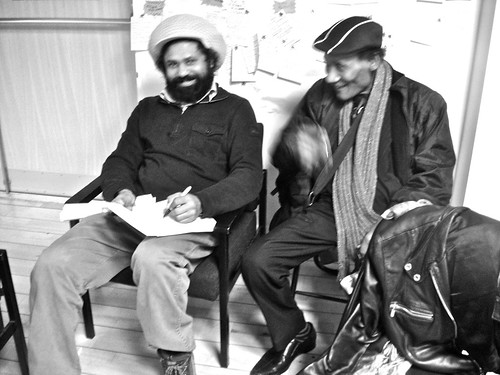
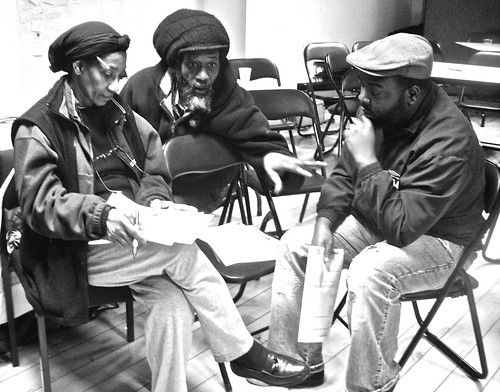
 It was intense, we worked from 10am to 5pm.
It was intense, we worked from 10am to 5pm. Here is an example of "who is here". And on the right is the bigger map of Loughborough Junction area, on which we pinned the people information.
Here is an example of "who is here". And on the right is the bigger map of Loughborough Junction area, on which we pinned the people information.




 Here is an example of a need we identified. And on the right is the bigger map of Loughborough Junction area, where we pinned all the identified needs to.
Here is an example of a need we identified. And on the right is the bigger map of Loughborough Junction area, where we pinned all the identified needs to.



 Here is one example of an opportunity and then to the right is the bigger map of them all, which we prioritized as a group. Over lunch a few of us then clustered them into themes.
Here is one example of an opportunity and then to the right is the bigger map of them all, which we prioritized as a group. Over lunch a few of us then clustered them into themes.
 We reflected on these themes as a group and chose the ones we wanted to focus on. A few people then led discussions on them throughout the afternoon. There were 8 discussion groups in the end.
We reflected on these themes as a group and chose the ones we wanted to focus on. A few people then led discussions on them throughout the afternoon. There were 8 discussion groups in the end.


 Specifically, the discussions had the following structure: What are possible solutions, what obstacles could there be, how we could overcome them. Here is an example of the outcome:
Specifically, the discussions had the following structure: What are possible solutions, what obstacles could there be, how we could overcome them. Here is an example of the outcome:


 We gathered back in plenary and shared outcomes. Some links between issues were spotted. For example, just the fact of focusing on young people led to a combined discussion of older and younger. It is important to spot these connecting links. If we do this as we go along, we will have less chance of working in silos.
We gathered back in plenary and shared outcomes. Some links between issues were spotted. For example, just the fact of focusing on young people led to a combined discussion of older and younger. It is important to spot these connecting links. If we do this as we go along, we will have less chance of working in silos.






